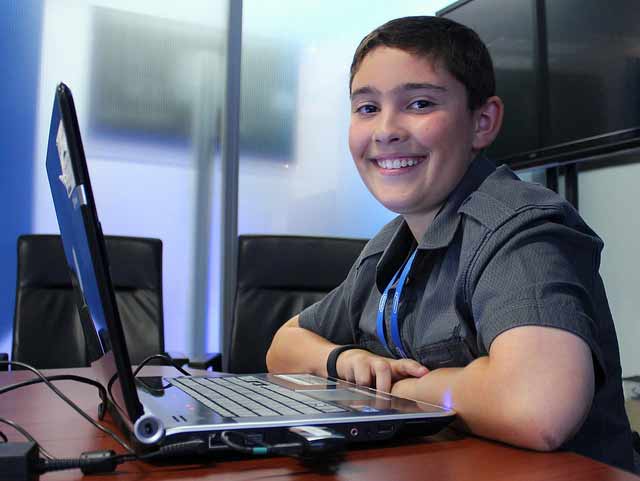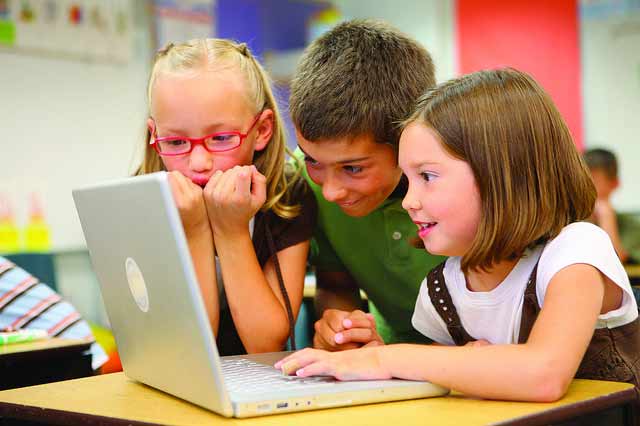Kids want more screen time? Offer these options to build strong skills in keyboarding, online research, internet safety, and yes, video game play too.
By Rachel Stamper
Here are some summer activities to help your kids gain the computing skills they need to keep up (and get get ahead).
Enroll in a Video Game Camp
Why you’ll like it: All your kids want to do is play Minecraft or Geometry Dash for hours on end. Many video-game-themed camps allow them to play — but also encourage them to dig deeper and learn about how games are actually built. There’s also a social aspect, since your kids will get to make friends with like-minded gamers in the camp.
Where to find it: You’ll find dozens of options in the San Francisco Bay area, and beyond, on ActivityHero’s list of Gaming Camps & Classes (Note: Summer camp spots fill up fast as early as springtime, but there are still options for July and August, so don’t fret if you’ve waited till the last minute!)
Find computer classes & camps near you > >
Build Strong Keyboarding Skills
Why you’ll like it: Many kids hunt and peck and never learn proper home-row typing skills. After all, they only need four keys to navigate a character through most video games (W, A, S, and D). Summer is a great time for your child to learn legitimate keyboarding skills. Worried they won’t be into it? Don’t be. Today’s typing instruction is way cooler than the dull “quick brown fox” drills that you remember.
Where to find it:
- Dance Mat Typing – The BBC (British Broadcasting Corporation) has tons of free educational tools online, and you don’t have to be a Brit to use them. This is a fun typing game that uses a talking goat to instruct. It’s perfect for kids in elementary school
- Fun to Type – The plus of this site is there is a wide array of typing games to play. However, some games can be played via hunt-and-peck, such as Ninja Cat (which has you type to kill zombie dinosaurs). Good for elementary through middle school.
- Power Typing – Here, you’ll find a tab that leads to “Qwerty” lessons. These are more traditional lessons that are better for kids in middle school and older. If your older child continues to use hunt and peck, try this program for 30 to 45 minutes a day.
- Typing Club – This is a program that many schools use. While it’s not as gamified as others, the “stats tracking” feature can spur your child toward faster mastery and allow you to monitor their progress. Great for grades 4 and up. Learn here, then reinforce with games on Fun to Type.
Create Docs, Spreadsheets, and Presentations
Why you’ll like it: Your kids will need to know how to create documents, spreadsheets and presentations like slide shows to be successful in high school, college, and the workplace. Get them started now. And if they need a little motivation, challenge them to use these tools to make a sales pitch — like, 10 reasons you should boost their allowance or take them to an amusement park. If their presentation is on point, be sure to reward them!
Where to find it:
- GCFLearnFree.org offers lessons on Word, Access, Excel, and PowerPoint for gratis. These run the gamut from how to create documents through advanced topics like mail merge and creating tables and charts. With video tutorials, written instructions, and downloadable practice sheets, these are best for older elementary schoolers, up through high school and beyond (adults too!).
- TES.co.uk has a set of great spreadsheet activities for grades 1 through 6. You have to register, but it’s free. Click “Download all 13 files” (find the blue bar on the right of the screento get the pack.
- e-LearningforKids.org has PowerPoint lessons aimed at the younger set of kids that are quite engaging for the younger set of kids. These are developed for the 2003 version, but will apply to the current iteration as well. Check out ActDen too, although it is heavy on text.
- KhanAcademy.org offers a wide array of courses on a variety of subjects (not just computer-related topics). All are free and all delivered online in an easy-to-understand format.
- udemy.com also has a wide selection of online content for different age groups. Not all of it is free, but when you search by course keyword, you can filter for courses that don’t cost a dime.
- Libre Office and Open Office are both free office tools to try if your Microsoft Office Suite is out of date or if you don’t want to pony up the big bucks to buy the new version. These are open source alternatives, completely free, and include document, spreadsheet, presentation and database applications. You can save documents from these programs into Microsoft-compatible files and can open Microsoft-created files.
Find computer classes & camps near you > >
Dive in to Online Research
Why you’ll like it: When you were a kid, if you asked Mom how to spell something, she’d tell you to look it up i the dictionary. You can do the same with your kids — but with everything, not just vocab words. For many kids, doing online research consists of seeking out video game cheats, watching YouTube videos, and searching for the next toy or tech they want you to buy. But in-depth internet-based research using legitimate sources will be a critical skill that can help them throughout their schooling and beyond. When your child asks a question, instead of answering, send them to the web. Do ensure your younger child’s computer has “safe search” turned on or a kid friendly web filter. Here are some excellent (and safe) internet research resources to satisfy the most curious minds.
Where to find it:
- The Internet Public Library (for teens) offers a great guide for research on the web. It explains what search engines are and how they differ from directories, how to phrase search terms properly, and how to bookmark internet sites for easy access during future research.
- Research Starters is offered by Scholastic in conjunction with Grolier Online and offers a wealth of resources for academic projects, research papers, and science projects — or kids can just have fun learning about the world.
- Virtual Middle School Library is a compendium of resources for research from student-friendly search engines to digital magazines and newspapers.
- Most public and school libraries offer free and extensive digital (online) research resources. Search your state’s name and “state library digital resources” to get login information to access them, or ask your local public librarian or school librarian for access information.
Learn Internet Etiquette and Safety
Why you’ll like it: Any kid growing up today has to know how to participate appropriately in social media. And even though you’re comfortable that you can keep an eye on them on Facebook, are you ready to supervise their use of Snapchat, Instagram, Tumblr, Vine, Yik Yak, and others that seem to be cropping up constantly? Give your kids some firm ground rules and practical instruction about the do’s and don’ts.
Where to find it:
- StaySafeOnline.org offers a wealth of resources to help your entire family stay safe online.
- BrainPOP offers a great video on digital etiquette for elementary and middle schoolers.
- Teaching Channel features a short, easy-to-grasp 2-minute video lesson on email etiquette that’s perfect for kids of all ages.
- Tween Parenting prepared a great lesson on text etiquette for tweens that’s worth watching and sharing.
Explore Coding and Computer Science
Why you’ll like it: Coding and computer science are the critical job skills of tomorrow, and the United States is trailing devastatingly behind on educating young people in these specialties. Don’t wait for them to learn the basics in college. There are many resources available to get your kids coding now — even as early as elementary school. Even President Obama is pushing the Hour of Code, an initiative to demystify computer science. Introduce your kids to these resources, and set them loose so they can find out the secrets behind creating the apps and video games they love.
Where to find it:
- Code.org is a nonprofit dedicated to educating young people of all ages on coding and computer science. Their resources use Frozen’s Elsa and Angry Birds to engage kids.
- KhanAcademy.org offers computer science classes, including a badge that takes middle school and older kids through lessons on everything from algorithms to cryptography and information theory.
- udemy.com also has a selection of coding content suited for middle and high schoolers and those kids who are mastering coding more adroitly.
Find computer classes & camps near you > >
Added together, these resources give your child a great way to get all the computing essentials. But did we forget anything? What tools would you recommend to other parents? Let us know in the comments section below your thoughts on what kids need to know about computers.




















